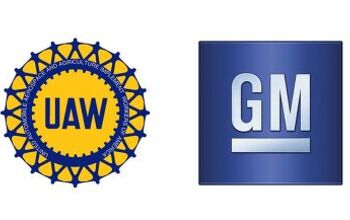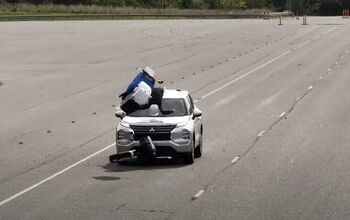Fiat Chrysler Reaches Proposed Tentative Agreement With UAW

If you’ve followed the news lately, that headline could easily include the term “scandal-plagued” twice. Fiat Chrysler, currently pursuing a merger deal with Groupe PSA while battling a racketeering lawsuit filed by General Motors, has inked a tentative four-year labor deal with the United Auto Workers — a union facing the biggest scandal in its history.
At least in this latest round of bargaining, the UAW didn’t have its former president, Gary Jones, lurking in the background under a cloud of suspicion. Jones resigned as president, and then from the union altogether, late last month after the board moved to oust him.
Thus far, FCA hasn’t said much about the proposal signed Nov. 30th, though the UAW has released snippets of its contents. GM, the first Detroit Three automaker to sit across the table with the UAW’s bargaining team, set the tone for deals to follow, providing a pathway to full-time employment for temporary workers, wage increases, jacked bonuses, and no changes to healthcare coverage. Ford followed suit last month.
While the FCA deal was expected to be a more difficult one to reach, it’s possible that the racketeering lawsuit, in which GM claims FCA bribed UAW officials to go easy on them during the last round of bargaining, coupled with the impending merger, helped the union draw concessions from its bargaining partner.
“Our UAW Bargaining Committee worked diligently, over many months, during the General Motors strike and Ford negotiations to maintain productive negotiations with FCA,” said UAW Vice President and UAW-FCA Department Director Cindy Estrada in a statement.
“The pattern bargaining strategy has been a very effective approach for the UAW and its members to negotiate economic gains around salary, benefits and job security. In addition to the $4.5 billion in major investments previously announced, negotiators secured an additional $4.5 billion for a total of $9 billion of investments adding 7,900 jobs during the contract period.”
Full details of the agreement won’t be released until the UAW-FCA National Council meets on December 4th to look over the proposed document and decide whether it’s good enough. After that, the deal goes to members for ratification. That vote would begin December 6th.
Acting UAW President Rory Gamble, who’s currently embarking on a clean-up operation aimed at avoiding federal oversight of the union (which is still a possibility, one federal prosecutor claims), hailed the tentative deal.
“FCA has been a great American success story thanks to the hard work of our members,” Gamble said. “We have achieved substantial gains and job security provisions for the fastest growing auto company in the United States.”
[Image: Fiat Chrysler Automobiles]

More by Steph Willems
Latest Car Reviews
Read moreLatest Product Reviews
Read moreRecent Comments
- W Conrad I'm not afraid of them, but they aren't needed for everyone or everywhere. Long haul and highway driving sure, but in the city, nope.
- Jalop1991 In a manner similar to PHEV being the correct answer, I declare RPVs to be the correct answer here.We're doing it with certain aircraft; why not with cars on the ground, using hardware and tools like Telsa's "FSD" or GM's "SuperCruise" as the base?Take the local Uber driver out of the car, and put him in a professional centralized environment from where he drives me around. The system and the individual car can have awareness as well as gates, but he's responsible for the driving.Put the tech into my car, and let me buy it as needed. I need someone else to drive me home; hit the button and voila, I've hired a driver for the moment. I don't want to drive 11 hours to my vacation spot; hire the remote pilot for that. When I get there, I have my car and he's still at his normal location, piloting cars for other people.The system would allow for driver rest period, like what's required for truckers, so I might end up with multiple people driving me to the coast. I don't care. And they don't have to be physically with me, therefore they can be way cheaper.Charge taxi-type per-mile rates. For long drives, offer per-trip rates. Offer subscriptions, including miles/hours. Whatever.(And for grins, dress the remote pilots all as Johnnie.)Start this out with big rigs. Take the trucker away from the long haul driving, and let him be there for emergencies and the short haul parts of the trip.And in a manner similar to PHEVs being discredited, I fully expect to be razzed for this brilliant idea (not unlike how Alan Kay wasn't recognized until many many years later for his Dynabook vision).
- B-BodyBuick84 Not afraid of AV's as I highly doubt they will ever be %100 viable for our roads. Stop-and-go downtown city or rush hour highway traffic? I can see that, but otherwise there's simply too many variables. Bad weather conditions, faded road lines or markings, reflective surfaces with glare, etc. There's also the issue of cultural norms. About a decade ago there was actually an online test called 'The Morality Machine' one could do online where you were in control of an AV and choose what action to take when a crash was inevitable. I think something like 2.5 million people across the world participated? For example, do you hit and most likely kill the elderly couple strolling across the crosswalk or crash the vehicle into a cement barrier and almost certainly cause the death of the vehicle occupants? What if it's a parent and child? In N. America 98% of people choose to hit the elderly couple and save themselves while in Asia, the exact opposite happened where 98% choose to hit the parent and child. Why? Cultural differences. Asia puts a lot of emphasis on respecting their elderly while N. America has a culture of 'save/ protect the children'. Are these AV's going to respect that culture? Is a VW Jetta or Buick Envision AV going to have different programming depending on whether it's sold in Canada or Taiwan? how's that going to effect legislation and legal battles when a crash inevitibly does happen? These are the true barriers to mass AV adoption, and in the 10 years since that test came out, there has been zero answers or progress on this matter. So no, I'm not afraid of AV's simply because with the exception of a few specific situations, most avenues are going to prove to be a dead-end for automakers.
- Mike Bradley Autonomous cars were developed in Silicon Valley. For new products there, the standard business plan is to put a barely-functioning product on the market right away and wait for the early-adopter customers to find the flaws. That's exactly what's happened. Detroit's plan is pretty much the opposite, but Detroit isn't developing this product. That's why dealers, for instance, haven't been trained in the cars.
- Dartman https://apnews.com/article/artificial-intelligence-fighter-jets-air-force-6a1100c96a73ca9b7f41cbd6a2753fdaAutonomous/Ai is here now. The question is implementation and acceptance.


































Comments
Join the conversation
Good that the workers are getting more but in the long run this will not last as more production is automated and more production is moved overseas. This of course will happen regardless if the workers get more. There will be more mergers and consolidations globally in the automotive sector.
Mercedes and BMW are in a whole different league than smaller compact cars and crossovers. For smaller less expensive vehicles it is still cheaper to make them in Mexico, China, Thailand, and India, Eventually the trade will be settled and the import duties will go down or in some cases eliminated. Even if vehicles are not produced overseas more automation will eliminated many of the higher paying auto jobs.